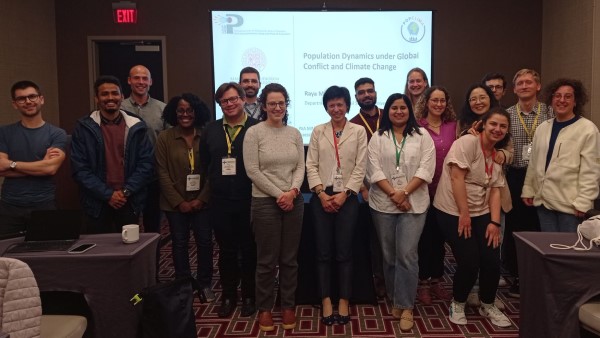Data and modeling approaches to assessing climate-conflict impact on population dynamicsNew Orleans, United States, 12 April 2023
The ongoing conflicts in Ukraine, Ethiopia, Nigeria, Syria, and Afghanistan, to name a few, coupled with small- and large-scale climate change impacts (e.g., seasonal variability, extreme events, and long-term changing conditions) have the potential to strongly affect human health, well-being, livelihoods, and social systems. Climate change impacts include extreme events with a large spatial extent like hurricanes and floods, but they also include more local experiences like drier conditions affecting crop yields, waterborne disease outbreaks or more frequent and intense heat waves. The effects of these events can be exacerbated when climate change impacts interact with conflict.
The IUSSP Panel on Population Dynamics under Global Conflict and Climate Change organized a workshop at the 2023 annual meeting of the Population association America (PAA) in New Orleans (Louisiana) on 12 April 2023 entitled "Data and modeling approaches to assessing climate-conflict impact on population dynamics". The workshop, organized by Raya Muttarak, Liliana Andriano, Risto Conte Keivabu, Roman Hoffmann, Kathryn Grace, and Francesca Zanasi, brought together 30 participants.

The workshop aimed at providing researchers with theoretical and analytical tools to assess how conflict and climate change affect a wide range of demographic outcomes, such as health, fertility, mortality, and migration. The one-day workshop comprised four parts that reconcile theoretical approaches and hands-on activities. First, an introduction to and overview of demographic research on conflict, climate change, and population dynamics. Second, an overview of the demographic, climate and conflict data sources available for research in this field, coupled with a practical session on linking spatial conflict and climate data (e.g. ACLED and ERA5 respectively) with georeferenced micro-level data (e.g. Demographic and Health Surveys) using the software R. Third, the afternoon session was devoted to critically approach conflict and climate change measurement, with reasoning on operationalization and causal inference. Finally, the workshop concluded with a practical session on statistical modelling with the software R.
 |
